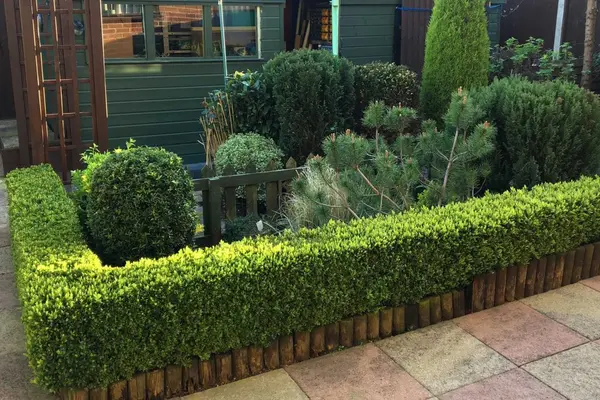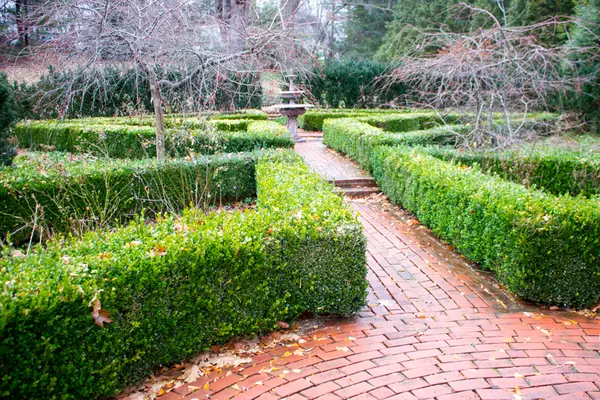Box hedging is a versatile and stylish way to define spaces in your garden while adding a touch of greenery. Whether you prefer natural or artificial hedges, they offer both aesthetic and functional benefits. Here are some creative ways to incorporate box hedges into your landscape.
Where To Use Boxed Hedging
- Low border hedges: define an edge without blocking the view of other plants and areas with a short hedge. A boxed hedge can protect trees from foot traffic, outline a flowerbed area or add a decorative element.
- Add privacy to an area: block your neighbours view into your garden with a five-foot high privacy screen. It’s natural and helps cool the area as well.
- Mark out spaces: use a boxed hedge to identify the edges of different areas in your garden and create useful dividers.
- Hide unsightly areas: use hedging to hide ugly infrastructure and revamp ageing fences to streamline your overall garden design.
- Windbreak: natural hedges are a natural windbreak, especially in areas that are prone to windy conditions.
Choosing the Perfect Box Hedge for Your Space

Best Plants for a Boxed Hedge
Boxwood: one of the most common plants used for a boxed hedge because it is very resilient. As an evergreen, it looks great all year round, and it’s easy to shape into your preferred form. It is available in many different varieties with some able to grow up to 20 feet in height. If you prefer a portable option though that you don’t need to wait for, consider purchasing a portable boxwood hedge.
Sawara False Cypress: also known as threadleaf false Cyprus,it is a slow growing variety. It will take around 20 years for it to grow to 6 feet so if you are looking for a tall hedge quickly, this is not the ideal plant for you. But its delicate leaves make an attractive hedge for your home.
Shrub roses: tough and much easier to grow than other varieties. You can prune them into the shape you desire, and you will end up with a garden border that looks and smells wonderful when in bloom. You can find more hedge plant ideas here.
How far apart do you plant a boxed hedge?
Generally, to work out how far apart you should plant for a standard hedge, decide how long you want it to be in metres and then multiply the length by five, this equals a spacing of 20 cm between each plant.
If your hedge will only be low, instead multiply the length by six and if your preference is for a tall, privacy hedge then only multiply by four.
Top Reasons to Choose Artificial Box Hedges

Artificial vs. Real Box Hedges: Which is Better?
 Pros of Artificial Box Hedges
Pros of Artificial Box Hedges
- Minimal Effort: No watering, trimming, or pest control is needed.
- Instant Benefits: The impact is immediate during installation as there are no waiting periods for growing plants.
- Recovery From Damage: Looks as good as new throughout the year in any environment.
Pros Of Real Box Hedges
- Natural Change: It transforms beautifully with every season, providing an aesthetically pleasing view.
- Natural: Friendly to the environment as it is a habitat for small wildlife and helps pollinators.
- Plants scrubbing carbon dioxide and improving general air quality in outdoor environments.
For a complete guide on boxwood hedges, check out this detailed greenery guide.
How to Plant and Maintain a Box Hedge
Ideal planting conditions
Hedging plants are hardy and able to grow in most soil types, including acid or alkaline, clay or sandy soils, and shade or harsh sun. The only area where you are not advised to plant them is in waterlogged areas.
When first planted and until they are established, water them well and in hot, dry conditions. Once they have grown enough, they can endure drought conditions. The hedge needs nutrients and water if the plant leaves have a copper tinge.
How to Shape Your Hedge
Your hedge will look balanced and attractive if you follow the right procedures when shaping the box hedge.
- Preliminary Cutting: In comparison to trimming, reducing cutting at the early stages helps promote faster vertical growth. This allows the hedge to fill out much quicker. For the first few years, try to avoid heavy cutting and, instead, seek to retain the hedge’s natural shape.
- Scheduled Cutting: When the height goal is achieved, the box hedge can be cut more often. Cut at minimum once in the spring and at the beginning of autumn. To prevent cutting out too many pieces, use clean and sharp pruners. For optimal growth, trim the lower part of the box hedge first and then make the top slimmer.
Additional Tips:
- Pest Management: Always check your hedge to see if there is an infestation of boxwood blight or boxwood leafminer. Treat it with proper pesticides or organic remedies as soon as possible.
- Mulching: Add a layer of mulch at the plant’s base to prevent weed growth, keep moisture, and control soil temperature.
Instant Box Hedges: The Fast-Track Option
Instant hedging provides an option for those who do not want to wait and work towards achieving a healthy landscape. They can eliminate the long waiting lines to get a lush landscape.
 Taller Plants:
Taller Plants:
Purchasing mature hedging plants is one way to achieve instant hedging and self-work time. These plants can be directly implanted in hedging boxes and container gardens to create an instant effect. For instance, boxwoods can also be purchased in every size, providing you with the dense green boundaries you seek. This method significantly lowers the waiting time by letting you enjoy a fully grown hedge.
Artificial Hedges:
Artificial hedges are the answer for those who want a quicker method. Box hedges are premade panels designed to resemble natural hedges and do not require any maintenance. They can easily be placed in areas with no soil or light and are available in various sizes. Forget about watering, dusting, or fertilizing – artificial hedges are the perfect solution for all, especially when real hedges are challenging to maintain.
Both choices have many benefits, including immediate results, which will convert your space quickly with little effort and time. Be it mature planting or artificial panels, box hedges can be placed instantly to improve your landscape effectively.
Final Thoughts
Box hedging is a timeless landscaping choice, offering both natural beauty and practical benefits. Whether you opt for real or artificial hedges, creative styling and strategic placement can transform your outdoor spaces into elegant, functional areas. If you’re considering a hassle-free alternative, explore high-quality artificial boxwood hedges for an instant, low-maintenance greenery solution.
FAQ
Boxwood is the most popular choice due to its resilience and year-round greenery.
Space them 20–30 cm apart for a dense hedge, depending on the variety.
Japanese Boxwood grows faster than other varieties and is easy to maintain.
English Boxwood is a top choice for its compact growth and classic appearance.



 Pros of Artificial Box Hedges
Pros of Artificial Box Hedges Taller Plants:
Taller Plants: 











